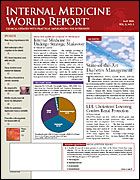Publication
Article
Midlife Obesity a New Risk Factor for Alzheimer's in Later Years
Author(s):
From the American Academy of Neurology
SAN DIEGO—Individuals who are extremely overweight or obese in their 40s may have a significantly higher risk of developing Alzheimer’s disease (AD) than their thinner counterparts. New data presented at the annual meeting of the American Academy of Neurology show a strong association between increased skinfold thickness in the subscapular and tricep region at midlife and risk of AD, independent of diabetes and cardiovascular-related comorbidities.
“This is the first study that has looked at skinfold thickness, and it is also the first study that has tried to understand how being overweight or obese in middle age is linked with the risk of Alzheimer’s disease,” said lead investigator Rachel Whitmer, PhD, of the Division of Research, Kaiser Permanente, Oakland, Calif.
Several recent studies have indicated that obesity may predispose to AD, dementia, cortical brain atrophy, and white-matter hyperintensities. However, regional variations in adiposity have not been examined in relation to risk for AD.
"If we don't control the current epidemic of obesity, the number of cases of dementia?may increase even higher than is currently predicted." ?Rachel Whitmer, PhD
Included were 8776 patients (55% women, 18% blacks) who underwent detailed health evaluations from 1964 through 1973 when they were between the ages of 40 and 45. All patients were followed for >30 years. They were evaluated for overweight and obesity by measuring skinfold thickness below the shoulder and at the back of the upper arm.
Both skinfold measurements were associated with an increased risk for AD. Those with the highest shoulder skinfold measurements were nearly 3 times as likely to develop AD as those with the lowest. For arm measurements, those in the highest group were 2.5 times as likely to develop AD as those in the lowest group.
The results did not change even after adjusting for age, sex, race, education, body mass index, smoking, alcohol use, marital status, diabetes, hypertension, hyperlipidemia, stroke, and ischemic heart disease.
“These results need to be confirmed, but they suggest that keeping your weight down in midlife can help you remain mentally alert later on in life. And if we don’t control the current epidemic of obesity, the number of cases of dementia in the future may increase even higher than is currently predicted,” said Dr Whitmer.
IMWR
“We are in a new line of work, where we are looking at some inflammatory markers and adipose cytokines, and we are trying to understand the effects of fat cells on the blood-brain barrier. We want to better understand what the effects are from these adipose cytokines on cognitive function and memory,” she told .
She advised physicians to tell their middle-aged patients “to stay active and watch their weight, because it may not only be good for the heart but also the brain.”






